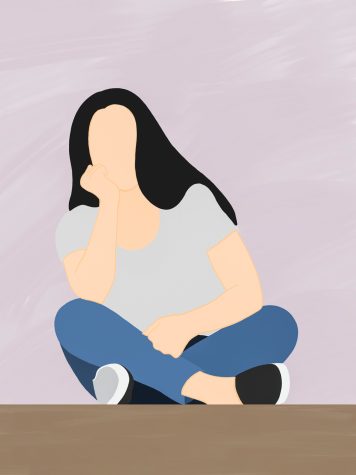Being positive changes your life
College students’ negative mindsets can affect outlook on education
Student, Gabriel Szabo, sits on his computer during the first week of school. Organization is vital to help relieve stress in the beginning of the semester.
August 26, 2021
The idea of working on one’s mindset, attitude or approach to life has become more mainstream in the wake of quarantine and COVID-19.
Particularly for students who have access to influential social sites like TikTok and Instagram, the implementation of positivity into daily life has grown quickly among younger people.
To me, having a positive mindset means getting rid of the negativity holding you back from doing well in life.
There are many ways to practice positivity. Some of these practices include daily affirmations, recognizing the good in each day and being grateful for what you have. Meditation and journaling are popular ways to work on changing your mindset.
At the start of the pandemic, I was a freshman in college struggling with the overwhelming feeling of having school go from in person to virtual.
I struggled with maintaining a positive mindset. How can you be positive when you have multiple homework assignments due every day on top of hours of time sitting in class?
Easier said than done, a positive mindset takes a while to mold. But it is never too late to start.
WSU associate professor Clif Stratton is the director of University Common Requirements — the basic courses most WSU students must take in their first years here.
These classes can often be tedious for freshmen or a dreaded subject seniors must take at the last minute to graduate. Stratton provides a very helpful aspect to classes he lectures, giving students a positive environment to succeed in.
“Being rested goes a long way in navigating the rest of the day,” Stratton said. “The other is the technique called mindfulness, being conscious of your surroundings, how you’re feeling — even little things like your posture.”
Mindfulness is something that takes a lot of practice. Bringing a level of self-awareness to your thoughts, feelings and surroundings does not happen overnight, but the outcome — a more balanced, centered mind — can bring those same characteristics to your entire life.
Getting a college education, however time-consuming, tedious and sometimes stressful, is something to be excited about. Not everyone has the opportunity to further their education.
While you are here in Pullman working toward your degree, there are many resources to help students get through stressful times. Working to create a positive mind also helps more than many students realize.
“The way faculty can help with this is how they structure classes,” Stratton said. “[They can] build in safety nets that allow them to then motivate students who might be too anxious and disengage.”
Coming into class with a positive mindset will only help attention and focus for that class. It is extremely helpful for professors during this time to be aware of students’ many stressors.
Staying organized can also help impact a positive lifestyle and reduce stress. Students often see the outlook on classes and how much they have to do and feel stressed. Organizing assignments can prevent you from feeling overwhelmed when deadlines arise.
Kyra Thomas, freshman wildlife ecology and conservation major, describes feeling very excited being on campus and getting ready for classes.
“I like to get started on things right away,” Thomas said. “It helps with a positive [mindset] because I have more time to do things.”
Stress is a big part of a student’s everyday life. However, living in worry will not help you finish assignments on time or show up to class consistently.
Seeing our mindset about these stressors as something we can control can give us a better idea of how we should work to get through them.
Use this time on campus to work meditation, journaling or breath work into your daily routine. It could change your mindset on the stresses of school, and your life.


















